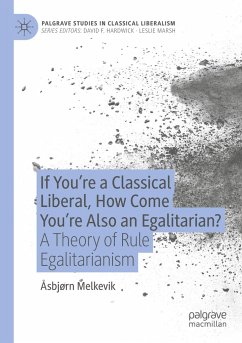Classical liberalism has wrongly been regarded as an ideology that rejects the welfare state. In this book, Åsbjørn Melkevik corrects this common reading of the classical liberal tradition by introducing a theory of "rule egalitarianism". Not only is classical liberalism compatible with social justice, but it can also help us understand why some egalitarian endeavours are an essential feature of a market society. If a necessary link exists between the classical liberal tradition and the moral and institutional dimensions of the rule of law, then this tradition is bound to uphold a substantial form of social justice. Coherence requires that classical liberals like Friedrich Hayek and Milton Friedman adopt an authentic egalitarian program. They should ameliorate poverty and limit inequality not merely out of prudence or collective self-interest, but for the natural justice of ongoing social cooperation as well as for the impartiality of market institutions.
Bitte wählen Sie Ihr Anliegen aus.
Rechnungen
Retourenschein anfordern
Bestellstatus
Storno








